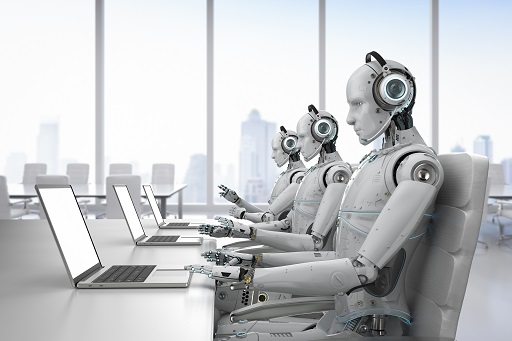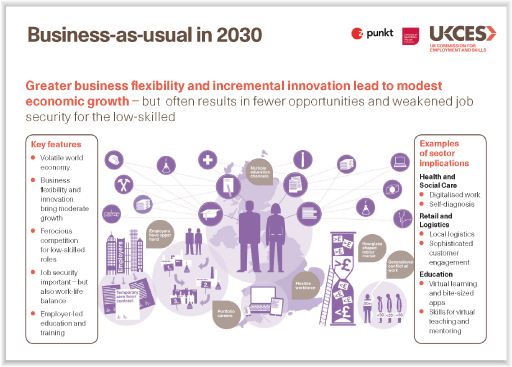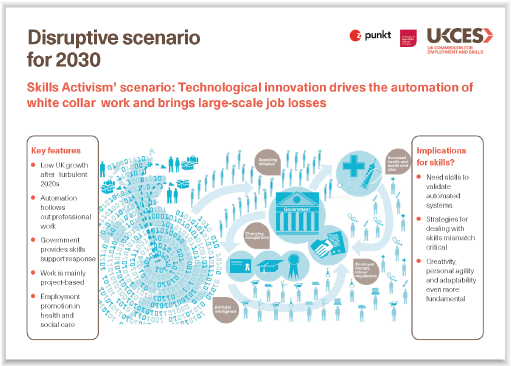3 Careers of the future
To finish this course, you’ll take a moment to fast forward to the long-term vision, to gain a sense of the kind of changes the government anticipates might – or might not – come in the next 15-20 years. No one can predict the future, but awareness of potential change in your chosen occupational sector can help you to assess levels of risk and respond ahead of time – enhancing your career resilience. How future aware are you?
In 2014 the UK Commission for Employment and Skills (UKCES) produced The Future of Work: Jobs and Skills in 2030. In it, they suggested different possible scenarios for work in the future – each dependent upon the way in which the economy may, or may not, grow (UKCES, 2014). Two of these scenarios are presented below:
- Figure 5 shows ‘business-as-usual’, which looks at how the way we work now will gradually change in the future.
- Figure 6 shows a more disruptive ‘skills activism’ scenario.
Common to both the scenarios presented here is the increasing influence of online working, which you looked at briefly in Week 4 and which of course has been accelerated by the pandemic; and creation of a ‘virtual’ workforce, artificial intelligence and robotics. Some projections from the United States have robotics and artificial intelligence automating more than 40% of jobs in the US in the next 20 years.
The business-as-usual scenario (Figure 5) looks at the implications of greater business flexibility and incremental innovation. The report describes an ‘hourglass-shaped labour market’ where highly skilled individuals have greater autonomy and a better work life balance, while lower skilled workers face increased competition for jobs, potentially trapping young people in low-level entry positions as older people stay in employment longer.
Three disruptive scenarios are presented in the report, but the one shown here (Figure 6) projects what could happen if technological change and automation leads to large-scale job losses. The report describes the prospect of people being hired on a ‘project-by-project’ basis, requiring increased creativity, adaptability, self-promotion and management skills.
In the next activity you’ll consider these two scenarios in more detail.
Activity 6 Looking to 2030
Note down what you think is most striking about the two scenarios and how this information might relate to the sector in which you are working.
What action do you think an individual could take to respond to these suggested pictures of the future?
Discussion
The Future of Work report identified that increased individual responsibility would be a key aspect of working life in the future. As the world of work becomes more flexible, employees will be expected to shoulder more and more responsibility for their own skill development. Self-management (e.g. juggling part-time roles with two employers), project management expertise and the ability to promote your personal brand will become increasingly vital.
Developments in technology, ICT and high-tech industries are a common theme. A commitment to learning new skills, and to updating existing ones, will be increasingly important.
International competition and technological development are likely to continue to increase the flexibility that employers demand from their employees (UKCES, 2014).
As change becomes more rapid or significant, personal agility – the ability to adapt to or embrace change – will be an important aspect of your career resilience.
These are scenarios of possible futures. No one can know what will actually happen, and it is likely that wholly unanticipated trends will also play a part. This research is from 2014, and we can already talk about developments and impacts that weren’t anticipated then. However, given the scale of the possible change, and the increased responsibility individuals will need to take for their own career progression, career resilience looks likely to become increasingly important.



